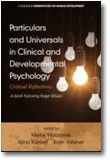
Particulars and Universals in Clinical and Developmental Psychology
Critical Reflections - A book honoring Roger Bibace
Edited by:
Meike Watzlawik, Sigmund Freud Privat Universität
Alina Kriebel, Universität Osnabrück
Jaan Valsiner, Niels Bohr Professor of Cultural Psychology, Aalborg University
A volume in the series: Perspectives on Human Development. Editor(s): Isabelle Albert, University of Luxembourg. Jaan Valsiner, Niels Bohr Professor of Cultural Psychology, Aalborg University. Koji Komatsu, Osaka Kyoiku University.
Published 2015
What sparks a psychologist’s interest in a certain phenomenon? Is it a symptom, a syndrome, a treatment, the usual, the exceptional, the group, the individual? An epistemologist, for example, focuses on the group and delivers group results. The clinician has to focus on the patient, although the patient may be perceived as one of a group (e.g., all patients with the same disease). The patient usually focuses on the clinician, but can take other opinions into account; especially, when the clinician is not considered to be the only authority. These dynamics – observable in therapy as well as in research – are critically reflected in this book, not only highlighting differences, but also commonalities individuals share: They all filter information and concentrate on certain aspects according to their socialization. They all have different expectations and can, yet, all deal with the same objective. Communication and building relationships seem to be vital – this book aims to support this quest by moving from the universal to the particular.
CONTENTS
Preface: Subjectivity and Knowledge Construction: Particular Perspectives and Universal Principles. SECTION I: THE THEORIST: BUILDING ON KNOWLEDGE AND EXPERIENCE(S). Relating to Dr. Werner: Past and Present, Roger Bibace. The Big Difference: The Explanatory Power of the Undifferentiated and Differentiated, Sven Hroar Klempe. World Hypotheses and Their Impact on Everyday Life, James D. Laird. SECTION II: THE PRACTITIONER: PSYCHOANALYTIC DEFENSES AND CONCEPTIONS OF ILLNESS. Children’s Conceptions of Illness, Roger Bibace and Mary E. Walsh. Korean Understanding of the “Maum” (Mind): Cultural Differences in Explaining the Causes of Illness, AeJa Jung. One of Many Stories About Freud: My Story as a Freudian Clinician, Roger Bibace. An Interpersonal Theory of Psychological Defense Mechanisms, Philip J. Rosenbaum. SECTION III: THE PHILOSOPHER: WHAT IS THE RIGHT THING TO DO? Ethical and Legal Issues in Family Practice, Roger Bibace, Ronald J. Comer, Carolyn E. Cotsonas, and Cambridge Health Alliance. Universal Principles? What is the Right Thing to Do and Why? The Influence of Culturally Imprinted Moral Values on Medical Students’ and Physicians’ Decision-Making, Alina Kriebel and Saskia Celina Stöckigt. Individualistic and Organizational Analyses of Informed Consent, Roger Bibace. Therapeutic Misconceptions: When the Voices of Caring and Research Are Misconstrued as the Voice of Curing, Michael Bamberg and Nancy Budwig. SECTION IV: THE PARTNER IN RESEARCH: A CLOSER LOOK AT THE RESEARCHER–PARTICIPANT RELATIONSHIP. An Introduction to Partnership in Research: Changing the Researcher–Participant Relationship, Roger Bibace, Steven Dine Young, Leslie Rupert Herrenkohl, and Angela Wiley. How Interests and Values Evolve (Sometimes Unpredictably): A Developmental Teleology of Research Encounters, Nikita A. Kharlamov, Aleksandra Kaszowska, and Roger Bibace. Collaborative and Comprehensive Research in Bahia, Brazil: Reframing Researcher–Participant Relationships, Ana Cecília de Sousa Bastos. Researcher–Participant Relationships in Different Settings: Theoretical and Methodological Issues Within the Framework of Semiotic-Cultural Constructivism, Lívia Mathias Simão, Danilo Silva Guimarães, Djalma Francisco Costa Lisboa de Freitas, Suara Bastos, and Hernán Sánchez Rios. SECTION V: THE FRIEND AND MENTOR: MEETING ROGER BIBACE AND THE AUTHORS. Not a Mind Reader, Jaan Valsiner. Encounters With Impact. About the Contributors.
-
Paperback9781681233598
Web price: $45.04 (Reg. 52.99)
-
Hardcover9781681233604
Web price: $80.74 (Reg. 94.99)
- eBook9781681233611

- PSY007000 - PSYCHOLOGY: Clinical Psychology
- PSY039000 - PSYCHOLOGY: DEVELOPMENTAL: General
- PSY031000 - PSYCHOLOGY: Social Psychology
-
 Children and Money
Cultural Developmental Psychology of Pocket Money
Children and Money
Cultural Developmental Psychology of Pocket Money
-
 Collected Papers on Inner Speech
Collected Papers on Inner Speech
-
 Digital Developments
Perspectives in Psychology
Digital Developments
Perspectives in Psychology
-
 Families and Family Values in Society and Culture
Families and Family Values in Society and Culture
-
 Family Formation Among Youth in Europe
Coping with Socio-Economic Disadvantages
Family Formation Among Youth in Europe
Coping with Socio-Economic Disadvantages
-
 Trans-Generational Family Relations
Investigating Ambivalences
Trans-Generational Family Relations
Investigating Ambivalences
-
 Vygotsky’s Pedology of the School Age
Vygotsky’s Pedology of the School Age

